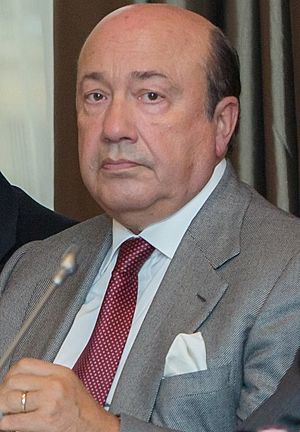Igor Ivanov facts for kids
Quick facts for kids
Igor Ivanov
|
|
|---|---|
|
Игорь Иванов
|
|

Ivanov in 2014
|
|
| Secretary of the Security Council of Russia | |
| In office 9 March 2004 – 17 June 2007 |
|
| President | Vladimir Putin |
| Preceded by | Vladimir Rushailo |
| Succeeded by | Valentin Sobolev (acting) Nikolai Patrushev |
| Minister of Foreign Affairs | |
| In office 30 September 1998 – 24 February 2004 |
|
| President | Boris Yeltsin Vladimir Putin |
| Preceded by | Yevgeny Primakov |
| Succeeded by | Sergey Lavrov |
| Personal details | |
| Born | 23 September 1945 Moscow, Russian SFSR, Soviet Union |
| Alma mater | Moscow State Linguistic University |
| Awards | |
Igor Sergeyevich Ivanov is a Russian politician and diplomat. He was the Foreign Minister of Russia from 1998 to 2004. He worked under Presidents Boris Yeltsin and Vladimir Putin. He was born on September 23, 1945, in Moscow.
Contents
Igor Ivanov's Early Life
Igor Ivanov was born in 1945 in Moscow, which is the capital city of Russia. His father was Russian, and his mother was Georgian. In 1969, he finished his studies at the Maurice Thorez Moscow Institute of Foreign Languages. Today, this school is known as the Moscow State Linguistic University.
In 1973, he started working for the Soviet Foreign Ministry. He spent ten years working in Spain. In 1983, he returned to the Soviet Union. Later, in 1991, he became the Russian ambassador in Madrid, Spain.
Role as Foreign Minister
Igor Ivanov became the Minister of Foreign Affairs on September 11, 1998. As Russia's foreign minister, he had important views on world events. He did not agree with NATO's actions in Yugoslavia. He also opposed the U.S. invasion of Iraq.
Ivanov played a key part in helping to solve problems in Georgia. In 2003, he helped mediate a deal between the Georgian President Eduard Shevardnadze and other political groups. This event was known as the "Rose Revolution".
Later Career and Retirement
In 2004, Sergey Lavrov took over as Foreign Minister. President Vladimir Putin then appointed Ivanov to a new role. He became the Secretary of the Russian Security Council. This council helps the President make important decisions about national safety.
On July 9, 2007, Ivanov decided to resign from his position. President Putin accepted his resignation on July 18.
After leaving government, Ivanov continued to be involved in international affairs. He is the president of the Russian International Affairs Council (RIAC). He also teaches as a professor at the Moscow State Institute of International Relations (MGIMO-University). He is a member of several international groups that work on important global issues. These include the International Luxembourg Forum on Preventing Nuclear Catastrophe. He is also part of the European Council on Tolerance and Reconciliation.
In 2011, Ivanov joined the Advisory Council of The Hague Institute for Global Justice. In 2014, he worked for The Moscow Times newspaper. In recent years, he has mostly stayed out of the public eye.
Awards and Honours
Igor Ivanov has received many awards for his work. These awards recognize his important contributions to Russia and diplomacy.
- Hero of the Russian Federation (1999)
- Order of Merit for the Fatherland, 2nd and 4th classes (1999, 1996)
- Order of the Badge of Honour (1988)
- Medal "In Commemoration of the 850th Anniversary of Moscow"
- Honoured Worker of the Diplomatic Service of the Russian Federation (2003)
- Gratitude of the President of the Russian Federation (several times between 1995 and 1999)
- Grand Cross of the Order of San Carlos from Colombia (2001)
- Order of Friendship (Vietnam) from Vietnam (2001)
- Order of Saint Blessed Prince Vladimir, 2nd class, from the Russian Orthodox Church (2003)
- Commemorative Medal Gorchakov (2005)
- "Silver Cross" of the Russian Biographical Institute (1999)
- Laureate of the "Man of the Year" award (1999)
See also
 In Spanish: Ígor Serguéievich Ivanov para niños
In Spanish: Ígor Serguéievich Ivanov para niños
- List of Heroes of the Russian Federation
 | Jackie Robinson |
 | Jack Johnson |
 | Althea Gibson |
 | Arthur Ashe |
 | Muhammad Ali |

